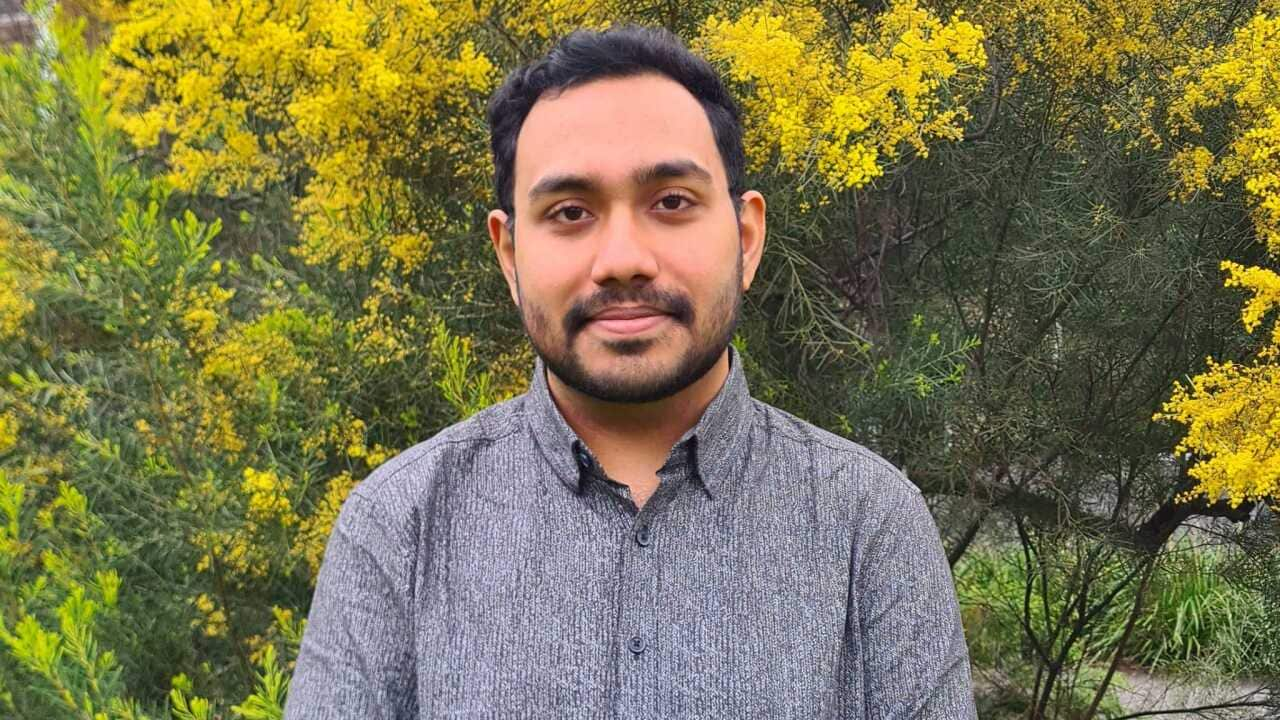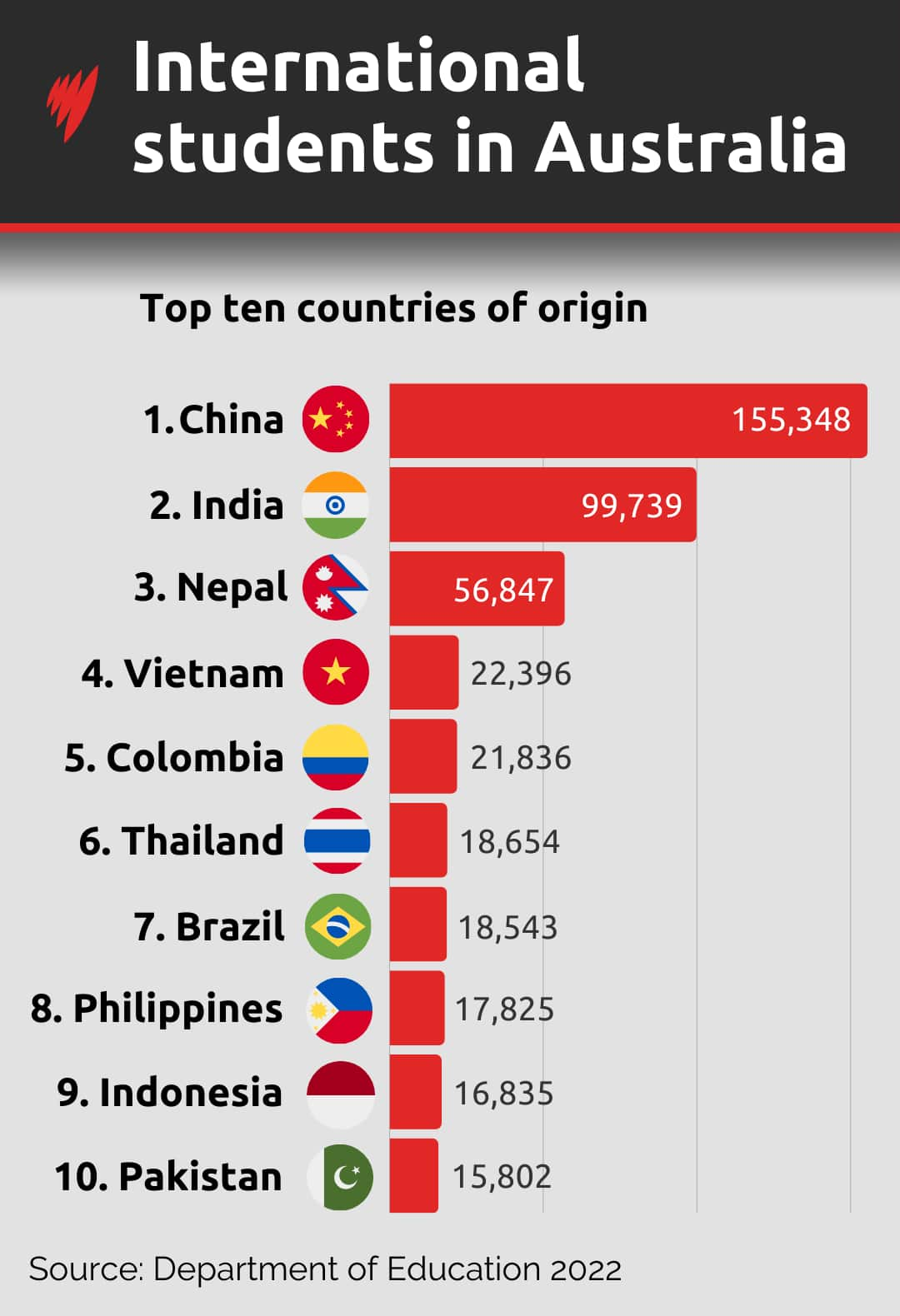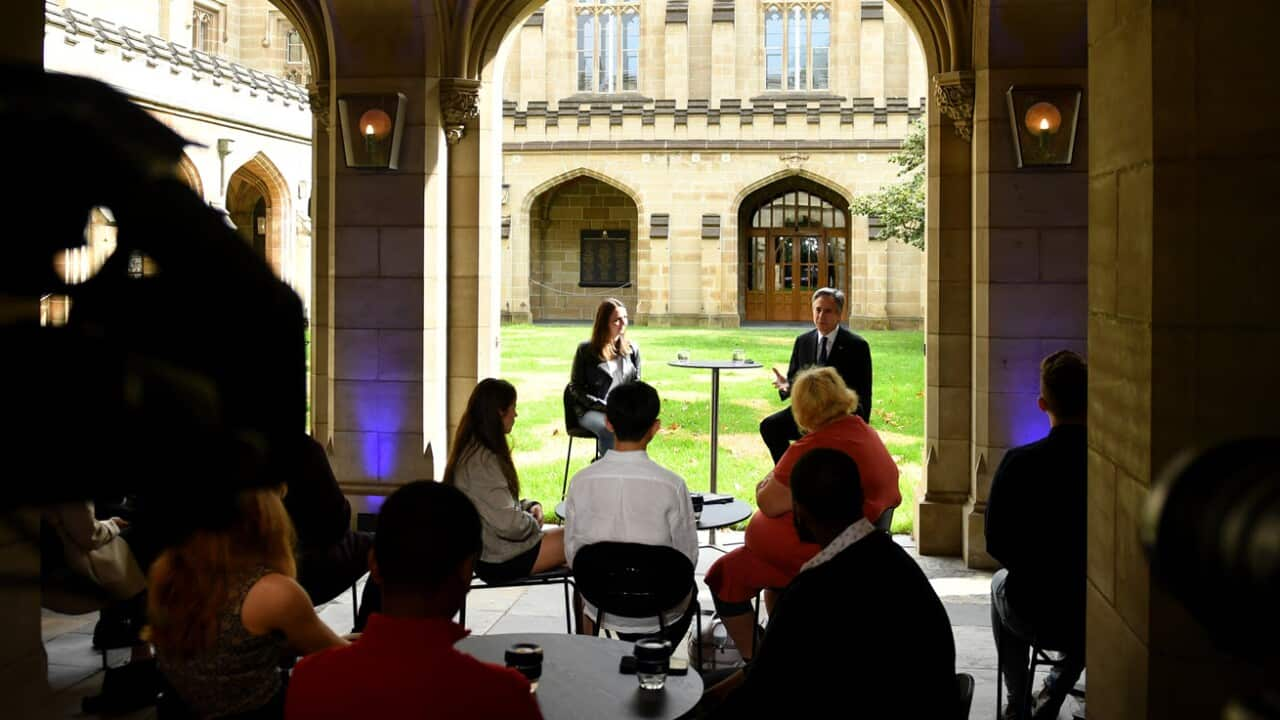

8 min read
This article is more than 1 year old
Feature
These uni students are working 'extreme hours' to make ends meet, but a crackdown is looming
As university students prepare for a new academic year, experts warn many are juggling multiple jobs to cover rising costs and support their families ahead of a looming crackdown on student visa work hours.
Published 18 February 2023 6:47am
Updated 18 February 2023 1:29pm
By Rayane Tamer, Sandra Fulloon
Source: SBS News
Image: International student Sadman Arafat is working 60 hours a week to keep up with Australia's cost of living crisis. (Supplied / Sadman Arafat)
Sadman Arafat spends his days and nights in a hustling grind during his university break to keep a roof over his head.
The 21-year-old international student is clocking up an average of 60 hours of work a week as he runs himself ragged, taking orders and serving food at a restaurant in Melbourne's southeast.
"My record was [working] almost 75 hours in one week," he says.
Sadman arrived in Australia in December 2021 from Bangladesh, following the opening of borders for international students as COVID-19 restrictions eased.
Student visa work hours restrictions were temporarily removed to address pandemic . Late last year, the federal government announced caps on student working hours would be They were previously capped at 40 hours a fortnight.
In a statement to SBS News, the Department of Home Affairs confirmed a cap will return but it will review the fortnightly limit upon consultations with peak bodies on what is most appropriate for student visa holders.
"The number of hours will be determined following consultation with peak bodies across industry and education sectors, with a view to striking the right balance between work and study, and will be communicated to students prior to the change taking effect," a spokesperson said.
For now, time is running out for students like Sadman to save as much as possible before the first semester of university begins next week.
Sadman wasn't aware that he will be forced to cut back on work until SBS News informed him of the rules - and feels like the news hasn't been communicated enough to international students.
He says the news "sent me into a state of panic".
"My primary purpose here is to study but I can only afford to cut a few hours because, at the end of the day, I need to make the minimum amount of pay I need every week to survive," he says.
The exhaustion means he's struggling to eat, his mental health has taken a hit and constantly worries about how he can keep up his grades.
I need to make the minimum amount of pay I need every week to survive.Sadman Arafat
The Department of Home Affairs spokesperson said the cap will help in "protecting the quality and reputation of Australia’s international education and training sector" and to obtain a "quality" education.
'It is exhausting, but we have no other choice'
Unlike Sadman, Madhu Damodarasamy has been aware of the impending crackdown on international students' work caps - and she's dreading when the limit will be reinstated.
Madhu is an international student from India, in her final year of her master's of engineering management, and she's been working 50 hours a week during the break.
While she says her hours are "quite tiring", it's the only solution to pay her rent - which has bumped from $700 a month to nearly $1,000 in one year. At the back of her mind, too, is a permanent residency application, which she says will set her back $3,500.
"After working a double shift continuously from 11 to 11, I get back to uni and I have to study till 1am at least to manage my assignments," she says.
In less than six months, she'll be forced to slash more than 50 per cent of her wages to abide by government rules while also managing to keep up with Australia's cost of living crisis.
"It is exhausting, but we have no other choice because the cost is high everywhere," she says.
Naunihal Singh, another Indian international student, works 35 hours a week, stacking shelves at several Melbourne supermarkets.

Naunihal Singh in Melbourne. Credit: SBS / Scott Cardwell
“And salaries don’t increase by 8 per cent, just because the inflation rate is rising. So, it’s getting harder to manage."
Like Madhu, Naunihal and many other international students hope to remain in Australia and become permanent residents or pursue further studies.
“I am working as much as I can right now so that I can save money, knowing that the restrictions will be back soon,” Naunihal says.
While some sectors are paying significant salary increases, real wages grew by just 3.1 per cent in the year ending September 2022, according to the Australian Bureau of Statistics. This was easily outstripped by which hit 7.8 per cent in the year to December, the highest since 1990.
"My rates are almost the same as when I first started working [in February last year], but my rent went up, my fuel prices went up and also my cost of living went up on top of my university fees, which also went up," Sadman says.
Some international students are struggling to focus at university because they are working multiple jobs, according to Yeganeh Soltanpour, who is the national president of the Council of International Students of Australia.
"I know of students working extreme hours to make ends meet," she says.
"Some are working full-time jobs while studying, and some are even doing extra casual shifts on weekends at a petrol station or driving ride-share vehicles at night and studying in between rides.
"With the current rental and cost of living crisis, this is a reality for many students."

Source: SBS News
"I think it is getting harder for most students, and this can cause distress if they cannot maintain good grades."
For Madhu, a drop in her grades is "a nightmare", but doesn't know how she will manage a distinction average while working day and night.
Once the new semester starts, Sadman, Madhu and Naunihal have all said they will reduce their work hours to around 25-35 hours a week to focus on their studies.

Naunhial works to pay his living expenses in Australia. Credit: SBS / Scott Cardwell
Phil Honeywood, CEO of the International Education Association of Australia says some foreign students are working too hard.
“Australia has a large number of students from the subcontinent: India, Nepal and Sri Lanka. Some are working multiple jobs and up to 100 hours a week," Mr Honeywood says.
“However, we know of many experiencing mental health pressure from families back home who say ‘well, if you can earn that many Australian dollars by working unlimited hours while you supposedly study full-time, then you can send money home."
'Expectations are high': Students face pressure to send money home
To obtain a study visa, Mr Honeywood says applicants must prove they can pay for tuition and support themselves. But some families expect students to keep earning, and juggling full-time study with work can be stressful.
“If you are working two or three part-time jobs all hours of the day and night, then really the pressure on you is enormous," he says.
Dr Madhvi Mohindra runs a private counselling practice in Parklea in western Sydney and sees three to four university students each week.
Dr Mohindra migrated to Australia from northern India in 2009.
“As a migrant from India, I understand Indian culture and rituals. I know some young people studying abroad, whose families expect that from day one they will send money home," she says.

Dr Madhvi Mohindra. Credit: Dr Madhvi Mohindra
As pandemic restrictions ease, international students are flooding back to Australia, with the tertiary sector seeing enrolments surge. In the last six months, a record number of 334,262 student visas have been granted - a 23 per cent rise from pre-COVID levels.
"Allowing international students to work provides valuable skills to the Australian workforce, while enhancing the social and educational experience of students during their stay in Australia. However, work should always be ancillary to study," the spokesperson said.
China recently banned its citizens from studying online at foreign universities, forcing up to 40,000 Chinese students back to Australia to complete their qualifications.
In 2022, China was the leading country of origin for international students in Australia with 155,348 students followed by India (99,739) and Nepal (56,847).





